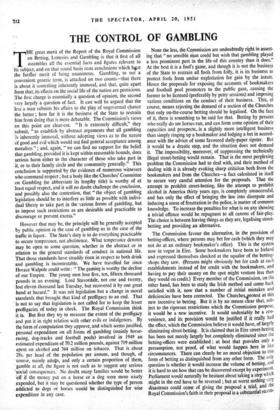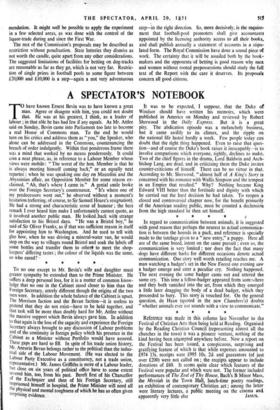THE CONTROL OF GAMBLING
THE great merit of the Report of the Royal Commission on Betting, Lotteries and Gambling is that it first of all assembles all the essential facts and figures relevant to its subject, and on that sound basis rests conclusions which hi.ve the further merit of being unanimous. Gambling, to use a convenient generic term, is attacked on two counts—that there is about it something inherently immoral, and that, quite apart from that, its effects on the social life of the nation are pernicious. The first charge is essentially a question of opinion, the second very largely a question of fact. It can well be argued that the less a man submits his affairs to the play of ungoverned chance the better ; how far it is the business of the State to restrain him from doing that is more debatable. The Commission's views on this point are clear-cut. " It is extremely difficult," they submit. " to establish by abstract arguments that all gambling is inherently immoral, without adopting views as to the nature of good and evil which would not find general acceptance among moralists " ; and, again, " we can find no support for the belief that gambling, provided it is kept within reasonable bounds, does serious harm either to the character of those who take part in it, or to their family circle and the community generally." This conclusion is supported by the evidence of numerous witnesses who command respect ; but a body like the Churches' Committee on Gambling (to abbreviate its lengthy title) is worthy of at least equal respect, and it will no doubt challenge the conclusion, and possibly also the contention, that " the object of gambling legislation should be to interfere as little as possible with indivi- dual liberty to take part in the various forms of gambling, but to impose such restrictions as are desirable and practicable to discourage or prevent excess."
However that may be, the principle will be generally accepted by public opinion in the case of gambling as in the case of the traffic in liquor. The State's duty is to do everything practicable to secure temperance, not abstinence. What temperance denotes may be open to some question, whether in the abstract or in relation to the general standards of conduct in national life. That those standards have steadily risen in respect to both drink and gambling is incontestable. We have travelled far since Horace Walpole could write: " The gaming is worthy the decline of our Empire. The young men lose five, ten, fifteen thousand pounds in an evening. Lord Stavordale, not one and twenty. lost eleven thousand last Tuesday, but recovered it by one great hand at hazard." It was not legislation but a change in moral standards that brought that kind of profligacy to an end. That is not to say that legislation is not called for to keep the lesser profligacies of today in check. The Royal Commission think it is. But first they try to measure the extent of the profligacy and put it in right relation with other evils or indulgences. By the form of computation they approve, and which seems justified, personal expenditure on all forms of gambling (mainly horse- racing, dog-tracks and football pools) involved in 1949 an estimated expenditure of 70.2 million pounds. against 719 million spent on alcohol and 764 million on tobacco. That is about 28s. per head of the population per annum, and though, of course, mainly adults, and only a certain proportion of them, gamble at all, the figure is not such as to suggest any serious social consequences. No doubt many families would be better off if the money put on a horse or a dog were more wisely expended, but it may be questioned whether the type of person addicted to dogs or horses would be distinguished for wise expenditure in any case. None the less, the Commission are undoubtedly right in assert- ing that " no sensible man could but wish that gambling played a less prominent part in the life -of this country than it does." At the best it is a fool's game, and though it is not the business of the State to restrain all fools from folly, it is its business to protect fools from undue exploitation for gain by the astute. Hence the proposals for exposing the accounts of bookmakers and football pool promoters to the public gaze, causing the former to be licensed (preferably by petty sessions) and imposing various conditions on the conduct of their business. This, of course, means rejecting the demand of a section of the Churches that only on-the-course betting should be legalised. On the face of it, there is something to be said for that. Betting by persons who really do see horses run, and can form some opinion of their capacities and prospects„ is a slightly more intelligent business than simply ringing up a bookmaker and lodging a bet in accord- ance with the advice of some favoured daily-paper tipster. But it would be a drastic step, and the situation does not demand it. The impossibility, moreover, of suppressing the technically illegal street-betting would remain. That is the most perplexing problem the Commission had to deal with, and their method of dealing with it is already evoking sharp criticism both from the bookmakers and from the Churches—a fact calculated in itself to secure very careful attention for the proposals. That the attempt to prohibit street-betting, like the attempt to prohibit alcohol in America thirty years ago, is completely unsuccessful, and has only the effect of bringing the law into disrepute and inducing a sense of frustration in the police, is matter of common knowledge. To increase the penalties for what is on any showing a trivial offence would be repugnant to all canons of fair-play. The choice is between leaving things as they are, legalising street- betting and providing an alternative.
The Commission favour the alternative, in the provision of betting-offices, where persons may bet for cash (which they may not do at an ordinary bookmaker's office). This is the system now in vogue in Eire. Some bookmakers have been to Ireland and expressed themselves shocked at the squalor of the betting- shops they saw. (Persons might obviously bet for cash at such establishments instead of for credit with the bookmakers, and having to pay their money on the spot might venture less than they would on credit.) Every member of the Commission, on the other hand, has been to study the Irish method and come back satisfied with it, now that a number of initial mistakes and deficiencies have been corrected. The Churchesjorotest at this new incentive to betting. But it is by no means clear that, sub- ject to the rigorous restrictions which the Commission propose. it would be a new incentive. It would undeniably be a con- venience, and its provision would be justified if it really had the effect, which the Commission believe it would have, of largely eliminating street-betting. It is claimed that in Eire street-betting has been not merely largely but completely eliminated since the betting-offices were established ; at best that provides only a presumption, not proof, of what would happen here in like circumstances. There can clearly be no moral objection to this form of betting as distinguished from any other form. The only question is whether it would increase the volume of betting, and it is hard to see how that can be discovered except by experiment. Parliament would naturally be hesitant about taking a step which might in the end have to be reversed ; but at worst nothing very disastrous could come of giving the proposal a trial, and the Royal Commission's faith in their proposal is a substantial mom- mendation. It might well be possible to apply the experiment in a few selected areas, as was done with the control of the liquor-trade during and since the First War.
The rest of the Commission's proposals may be described as restriction without penalisation. State lotteries they dismiss as not worth the candle, quite apart from any other considerations. The suggested limitations of facilities for betting on dog-tracks are reasonable as far as they go, which is not very far. Restric- tion of single prizes in football pools to some figure between £20,000 and £10,000 is a step—again a not very adventurous step—in the right direction. So. more decisively, is the require• ment that football-pool promoters shall give accountants appointed by the licensing authority access to all their books. and shall publish annually a statement of accounts in a stipu- lated form. The Royal Commission have done a sound piece of work. The certainty that it will be assailed both by the book- makers and the opponents of betting is good reason why men and women without rooted prepossessions should study the full text of the Report with the care it deserves. Its proposals concern all good citizens.



































 Previous page
Previous page